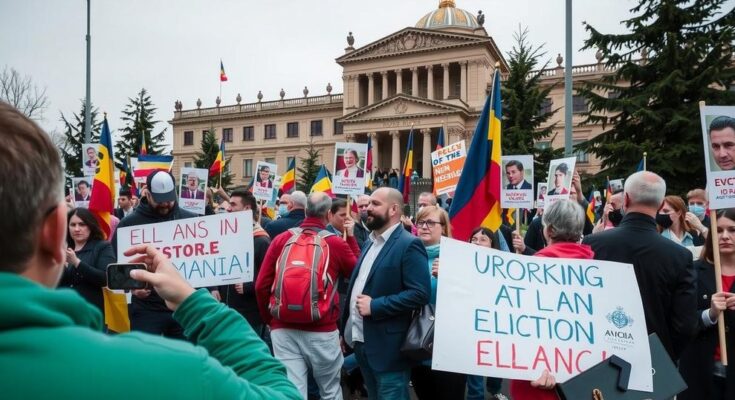Thousands of Romanians protested outside the Constitutional Court against the cancellation of the presidential election won by pro-Russian candidate Calin Georgescu. The court’s decision, which followed allegations of unfair campaigning, has intensified distrust in government institutions. A new election is set for May, while the political landscape remains polarized, raising concerns about the future of Romanian democracy.
On Friday, a substantial number of Romanians rallied outside the Constitutional Court in Bucharest to express their dissent regarding the cancellation of the presidential election initially scheduled for December. This cancellation followed allegations that Calin Georgescu, an unfamiliar pro-Russian candidate who led the polls, benefited from a questionable social media campaign purportedly linked to Russian interference. The protests, which have persisted intermittently since December 6, reflect broader discontent with the political establishment.
The ruling by the Constitutional Court, which came just days before the runoff election, has sparked serious concerns about the integrity of Romanian democratic processes, leading to increased polarization among voters. Both mainstream parties have faced criticism due to internal conflicts and corruption allegations, consequently empowering hard-right and ultranationalist factions that now command over one-third of parliamentary representation. Georgescu’s attorney has sought to have the court restore the election results, although Georgescu himself was not present at the gathering of approximately 4,000 supporters, who demonstrated with a mock coffin labeled “Democracy.”
Demonstrators vehemently voiced their demands, chanting phrases such as “We want to vote” and “Bring back the second round,” while displaying national emblems and Christian icons. Amidst this political unrest, the ruling coalition has announced plans to reschedule the election for May 4 and May 18, though the outcome remains uncertain regarding Georgescu’s eligibility for re-election. Meanwhile, outgoing President Klaus Iohannis will remain in office until a new president is elected, following his term expiration on December 21.
The ongoing political unrest in Romania has roots in the recent presidential election debacle that saw the Constitutional Court annul the electoral process just before its conclusion. This upheaval has prompted widespread protests from citizens dissatisfied with the perceived manipulation of democratic processes by both external influences and local political actors. The situation highlights Romania’s complex geopolitical positioning, particularly its interactions with both NATO and Ukraine amid regional tensions.
The protests outside Romania’s Constitutional Court represent a crucial moment in the nation’s political landscape, reflecting a significant backlash against the cancellation of the presidential election. The events underscore the growing frustrations with governmental integrity and the potential for radical political shifts. As Romania prepares to hold new elections, the outcomes will be closely monitored, particularly in light of the contentious political environment and external pressures.
Original Source: www.usnews.com




